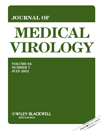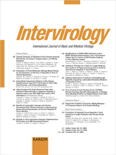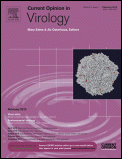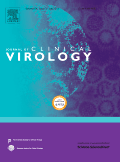
VIROLOGICA SINICA
Scope & Guideline
Illuminating the Pathways of Infectious Disease Research
Introduction
Aims and Scopes
- Viral Pathogenesis and Host Interaction:
Research focused on understanding the mechanisms by which viruses cause disease in their hosts, including studies on immune responses and the molecular interactions between viral components and host cells. - Viral Genetics and Evolution:
Investigating the genetic diversity, evolution, and epidemiology of viruses, including studies on mutations, reassortments, and phylogenetic analyses that elucidate viral transmission dynamics. - Antiviral Drug Development and Vaccinology:
Development and testing of antiviral agents and vaccines, including novel therapeutic approaches, vaccine efficacy studies, and the mechanisms of action of antiviral compounds. - Emerging and Re-emerging Viruses:
Research focused on newly identified viruses or those that are re-emerging, including zoonotic viruses, and their implications for public health. - Vector Biology and Virus Transmission:
Studies on the role of vectors in the transmission of viruses, including ecological and environmental factors that influence vector-host interactions. - Technological Innovations in Virology:
Application of novel technologies in virology research, including high-throughput screening, genomic sequencing, and bioinformatics approaches to study viral infections.
Trending and Emerging
- COVID-19 Research:
Research related to SARS-CoV-2 and COVID-19 has surged, encompassing studies on viral variants, immune responses, vaccine development, and long-term effects of infection. - Viral Zoonoses and Cross-Species Transmission:
There is an increasing focus on viruses that jump from animals to humans, highlighting the need to understand zoonotic diseases and their public health implications. - Antiviral Drug Repurposing:
The exploration of existing drugs for new antiviral applications has become prominent, particularly in light of the urgent need for effective treatments against emerging viruses. - Host-Pathogen Interactions:
Research examining the intricate interactions between viruses and their hosts is expanding, with a focus on immune evasion strategies and host susceptibility factors. - Metagenomics and Viral Diversity:
The use of metagenomic approaches to explore viral diversity in various environments (e.g., human, animal, and environmental samples) is increasingly prevalent, revealing new viral species and their potential impacts.
Declining or Waning
- Traditional Virology Methods:
There appears to be a waning interest in traditional virology techniques, such as classical culture methods for virus isolation, as newer molecular and high-throughput techniques gain prominence. - Non-pathogenic Viral Studies:
Research on non-pathogenic viruses or those with limited clinical relevance is decreasing, possibly due to a shift towards studies with direct implications for human health. - Basic Studies of Viral Structure:
While structural virology is still important, there has been a noticeable decrease in the number of publications that focus solely on the basic structural characteristics of viruses without linking them to functional or pathogenic outcomes.
Similar Journals

Virology Journal
Driving knowledge forward in the fight against viral diseases.Virology Journal, published by BMC, stands as a prominent open-access platform since 2004, dedicated to advancing the field of virology and infectious diseases. With its E-ISSN: 1743-422X, this journal is based in the United Kingdom and strives to disseminate high-quality research that enhances our understanding of viral pathogens and their interactions with hosts. Recognized with a Q1 classification in the category of Infectious Diseases and a Q2 in Virology for 2023, Virology Journal holds significant standing in the academic community, ranking #82/344 in Medicine - Infectious Diseases and #26/80 in Immunology and Microbiology - Virology. Its commitment to open access ensures that cutting-edge research is freely available to researchers, professionals, and students worldwide, fostering collaboration and innovation in the fight against viral diseases. The journal aims to publish original research articles, reviews, and commentaries that will stimulate discourse and spark new ideas within the virology community.

JOURNAL OF MEDICAL VIROLOGY
Elevating Research Standards: A Premier Source in Medical Virology.JOURNAL OF MEDICAL VIROLOGY is a prestigious academic publication dedicated to advancing the field of virology and infectious diseases. Published by WILEY, this journal has established itself as a cornerstone within the scientific community since its inception in 1977, and it will continue to provide cutting-edge research until 2024. With an impressive impact factor that places it in the Q1 quartile for both Infectious Diseases and Virology, the journal ranks 14 out of 344 in Medicine - Infectious Diseases and 6 out of 80 in Immunology and Microbiology - Virology according to Scopus metrics. Its focus encompasses a broad spectrum of topics, including viral pathogenesis, diagnostics, treatment strategies, and epidemiology, making it an essential resource for researchers, clinicians, and students alike. Although not an open-access journal, it provides valuable insights and accessible content for subscribers and libraries. The ongoing commitment to high-quality peer-reviewed articles makes JOURNAL OF MEDICAL VIROLOGY a vital platform for disseminating knowledge and fostering innovation in virology and related fields.

INTERVIROLOGY
Fostering knowledge in the fight against viral threats.INTERVIROLOGY is a leading academic journal dedicated to advancing the field of virology and infectious diseases, published by KARGER. With a commendable history since its inception in 1973, the journal is currently poised to explore innovative virological research through to 2024. INTERVIROLOGY is indexed with the ISSN 0300-5526 and E-ISSN 1423-0100, reflecting its commitment to maintaining high scholarly standards. The journal is categorized within the Q3 quartile for both Infectious Diseases and Virology as of 2023, demonstrating its relevance and contribution to the academic community. With Scopus rankings placing it as #130 in Infectious Diseases and #41 in Virology, INTERVIROLOGY serves as an essential resource for researchers, professionals, and students seeking cutting-edge insights and discoveries in virology. While it currently operates under a subscription model, its rigorous peer-review process ensures a high quality of published content, making it a cornerstone for those dedicated to understanding and combating viral diseases.

VIRUS RESEARCH
Unraveling the mysteries of viral interactions.VIRUS RESEARCH is a leading journal dedicated to the field of virology, published by Elsevier, and has been a cornerstone for researchers, professionals, and students since its inception in 1984. With an impressive impact factor, the journal is highly regarded, holding a Q2 category ranking in both Cancer Research and Infectious Diseases, as well as in Virology for 2023. Based in the Netherlands, it publishes high-quality, peer-reviewed articles that explore the intricate relationships between viruses and their hosts, novel therapeutic strategies, and advancements in virus biology. Researchers will find that it ranks 49th in Medicine - Infectious Diseases and 19th in Immunology and Microbiology - Virology according to Scopus, signifying its significant contribution and relevance in the academic world. VIRUS RESEARCH facilitates a platform for sharing groundbreaking discoveries, forming a vital part of the global scientific community, making it an essential read for those involved in the study of viral pathogens and their implications in medicine and biochemistry.

Journal of Virus Eradication
Catalyzing breakthroughs in epidemiology and immunology.Welcome to the Journal of Virus Eradication, a premier publication dedicated to advancing the field of virology and infectious disease research. Published by MEDISCRIPT LTD, this journal provides a vital platform for sharing cutting-edge research findings in key areas including epidemiology, immunology, and public health. With an impressive classification of Q2 in Epidemiology and Infectious Diseases for 2023, this journal exemplifies a commitment to high-quality scholarship and impactful research. The Journal of Virus Eradication is instrumental in disseminating knowledge that tackles viral threats, contributing to global health initiatives aimed at virus containment and eradication. Researchers, professionals, and students alike will find this journal an invaluable resource, making significant contributions to the scientific community and society at large.

Current Opinion in Virology
Unveiling Cutting-Edge Perspectives in VirologyCurrent Opinion in Virology, published by Elsevier Science Ltd, is a premier journal dedicated to advancing knowledge in the dynamic field of virology. Established as a respected source of comprehensive reviews and critical evaluations, this journal boasts an impressive impact factor and has achieved a distinguished Q1 category ranking for virology, signifying its pivotal role in the academic community. Serving researchers, professionals, and students alike, Current Opinion in Virology presents insightful contributions that delve into the latest developments, emerging trends, and pivotal challenges facing virology today. With its Scopus ranking placing it in the top 15% of its field, the journal provides unparalleled access to cutting-edge research that informs both basic and applied aspects of virology. Although not an open-access journal, it offers options for subscriptions that ensure accessibility to critical content. As the field continuously evolves, Current Opinion in Virology remains at the forefront, bridging the gap between research and clinical application, making it an essential resource for all in the virology community.

ANTIVIRAL RESEARCH
Exploring Breakthroughs in Virology and PharmacologyANTIVIRAL RESEARCH, published by Elsevier, stands at the forefront of the study of antiviral agents and therapy, with a dedicated focus on advancing the understanding of viral infections and their mechanisms. The journal is recognized within the top tier of academic publications, belonging to the prestigious Q1 category in both Pharmacology and Virology as of 2023, ranking 12th out of 313 in Pharmacology and 11th out of 80 in Virology according to Scopus metrics, reflecting its significant impact in the field. With a long-standing history since its inception in 1959, it continues to serve as an essential platform for researchers and health professionals alike, sharing critical findings that drive innovation in antiviral therapeutics. Although it does not currently offer open access options, the journal’s rigorous peer-review process ensures that every published article meets high academic standards, providing invaluable insights for those dedicated to enhancing public health through virology research.

VIRAL IMMUNOLOGY
Innovating research to combat viral infections through immunology.Viral Immunology, published by Mary Ann Liebert, Inc, stands as a prominent journal dedicated to advancing the understanding of the interplay between viral infections and host immune responses. With a strong focus on immunology, molecular medicine, and virology, the journal provides a platform for the dissemination of high-quality research findings and innovative methodologies that could shape the future of these critical fields. Although it currently holds a Q3 rating across its relevant categories and a respectable ranking within the Scopus database, Viral Immunology continues to strive for excellence with a commitment to publishing influential research that informs both academic and clinical practices. The journal accepts submissions in various formats—original research, reviews, and commentaries—catering to a diverse readership that includes researchers, professionals, and students engaged in the biological and medical sciences. Readers can anticipate insightful articles that address urgent challenges in immunological responses to viral infections, paving the way for new therapeutic strategies and public health initiatives.

JOURNAL OF CLINICAL VIROLOGY
Exploring the Evolving Landscape of Viral InfectionsJournal of Clinical Virology, published by Elsevier, stands at the forefront of virology research, focusing on the clinical implications of viral diseases. With an impressive impact factor representative of its Q1 categorization in both Infectious Diseases and Virology, this journal is essential for researchers and healthcare professionals aiming to keep pace with evolving knowledge and treatments in virology. Since its inception in 1998, it has provided a vital platform for the dissemination of significant breakthroughs, now continuing through to 2024. The journal boasts competitive Scopus ranks, placing it in the 95th percentile for Infectious Diseases and the 91st percentile for Virology. Scholars can benefit from its selective Open Access options, promoting widespread access to cutting-edge research. With an ever-increasing demand for innovative solutions to viral infections, Journal of Clinical Virology remains dedicated to fostering advancements in the field, making it a key resource for anyone invested in virology and infectious disease management.

VIRUS GENES
Innovating Research in Viral Genetics and ImmunologyVIRUS GENES is an esteemed journal published by Springer, dedicated to advancing our understanding of virology and its related fields, including genetics, molecular biology, and immunology. With a publication history that spans from 1987 to 2024, this journal provides researchers and professionals with a platform to disseminate high-quality, peer-reviewed articles that explore the intricacies of viral genetics and their implications in health and disease. With an impact factor placing it in the Q3 quartile across multiple categories in 2023, including Genetics and Virology, VIRUS GENES serves as a crucial resource for academics seeking to stay at the forefront of viral research. Its commitment to showcasing innovative research makes it an invaluable asset for students and professionals aiming to deepen their knowledge in the rapidly evolving landscape of virology. Although currently not offering Open Access, the journal ensures wide accessibility through institutional subscriptions, thereby playing a vital role in the collaboration between scientists globally.